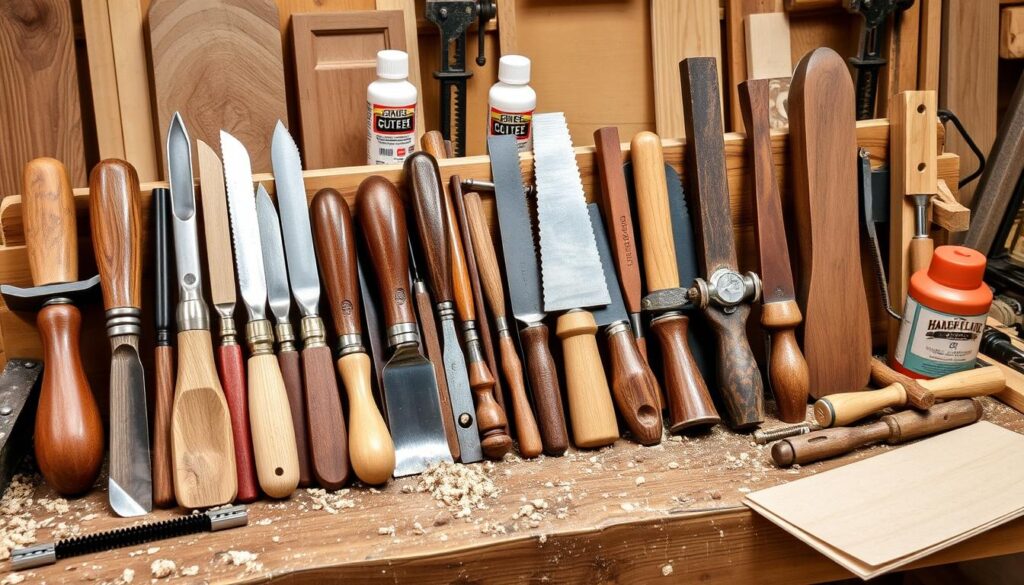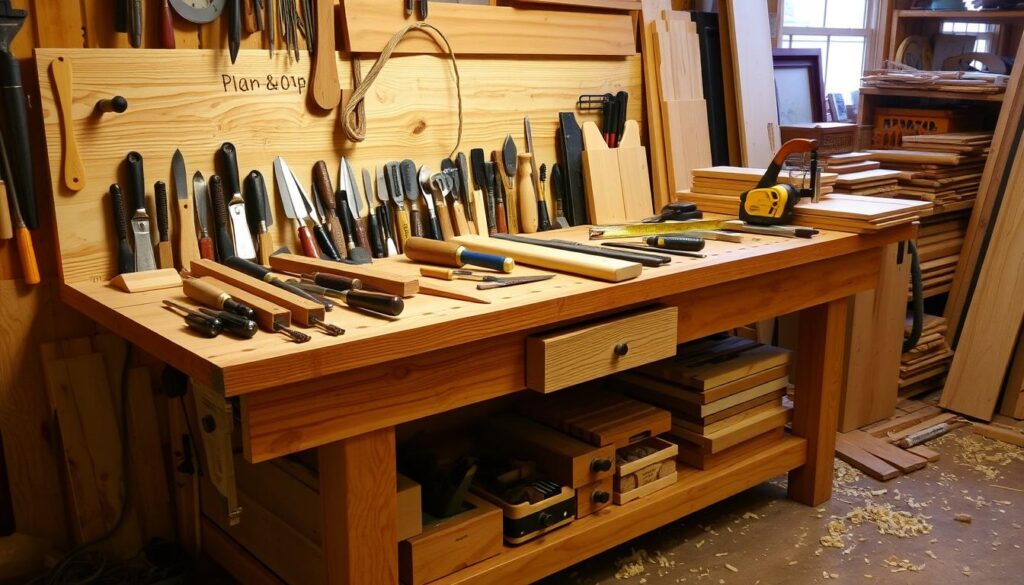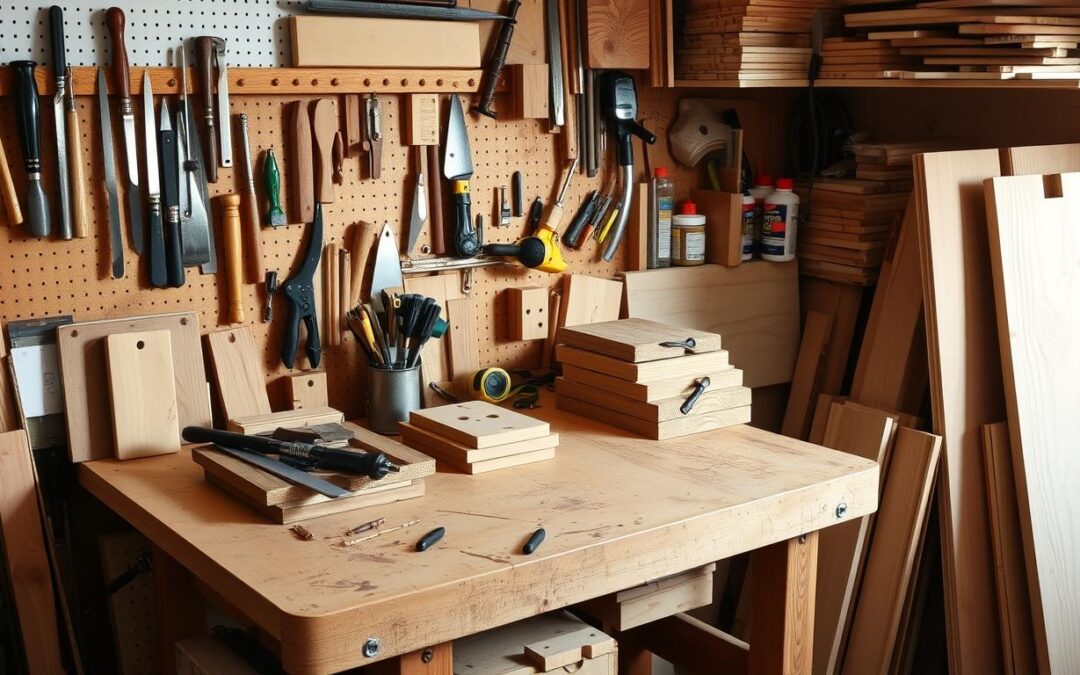Starting your woodworking journey? You’ll need the right tools and materials to make amazing projects. Whether you’re new or have lots of experience, good tools and materials are key. This guide will show you the best tools and hardware to improve your skills and make beautiful pieces.
We’ll cover everything from hand tools and power tools to safety gear and measuring tools. You’ll learn about different woods, fasteners, and joinery techniques. This knowledge will help you make smart choices and achieve your woodworking goals. Let’s start this journey together and unlock your creative potential.
Essential Tools for Beginning Woodworkers
Starting out in woodworking means you need the right tools. You’ll find everything from hand tools to power tools, and safety gear to measuring tools. This guide will help you know what tools every beginner should have.
Hand Tools vs. Power Tools
It’s key to know the difference between hand tools and power tools. Hand tools like chisels and hammers need more effort but give you control. Power tools, like drills, save time but need safety care. Beginners should start with a mix of both to learn well.
Safety Equipment Essentials
Woodworking can be risky without safety steps. You’ll need safety glasses, earplugs, gloves, and a dust mask. These protect you from debris, loud sounds, and dust, making woodworking safe and fun.
Measuring and Marking Tools
Getting your measurements right is vital in woodworking. Get a good tape measure, ruler, square, and pencil. Tools like a marking knife and combination square help with detailed cuts.
Building a strong tool base is the first step to becoming a skilled woodworker. Spend time finding quality woodworking hardware and woodworking supplies for your journey.
Best Supplies & Hardware for Crafters
As a crafter, you know the right tools make a big difference. Whether you’re carving wood, making furniture, or decor, good materials are key. They ensure your projects last and look great.
We’ve picked the top woodworking supplies and hardware for woodworking for crafters. They’re great for all skill levels:
- High-quality, fade-resistant wood stains and sealants to enhance the natural beauty of your projects
- Precision wood-burning tools for detailed designs and personalized touches
- Versatile clamps and vises to hold your work securely in place during assembly
- Specialty drill bits and jigsaw blades for intricate cutting and shaping
- Ergonomic hand tools like chisels, files, and sanders for meticulous finishing
Also, the right hardware for woodworking can make your projects stand out. Think about using decorative hinges, knobs, and pulls. They add a special touch to your work.

Choosing top-notch woodworking supplies and hardware for woodworking lets you make amazing crafts. These crafts will show off your creativity and skill. Enjoy crafting with the best materials.
Understanding Different Types of Wood and Materials
As a woodworker, knowing about the many wood types and materials is key. From classic hardwoods to versatile engineered woods, there’s a lot to choose from. Let’s look at the main differences and what to consider for your projects.
Hardwood vs Softwood Selection
Hardwoods, like oak, maple, and cherry, are tough and have beautiful grain patterns. They’re often chosen for furniture, cabinets, and detailed woodworking. Softwoods, such as pine and cedar, are cheaper and easier to work with. They’re great for DIY projects and building.
Plywood and Engineered Woods
Plywood and engineered wood, like MDF and particleboard, have their own benefits. Plywood is strong, stable, and consistent, making it versatile for many projects. Engineered woods are a cost-effective option that offers quality and performance.
Sustainable Wood Options
- Bamboo: A fast-growing grass that is becoming increasingly popular for its eco-friendly and renewable properties.
- Reclaimed wood: Repurposing wood from old buildings, furniture, or other sources can be a sustainable and visually appealing choice.
- Certified hardwoods: Look for wood that carries certifications like FSC (Forest Stewardship Council) to ensure responsible forest management.
| Wood Type | Hardness | Durability | Common Uses |
|---|---|---|---|
| Oak | High | Excellent | Furniture, cabinetry, flooring |
| Maple | High | Excellent | Furniture, cabinetry, musical instruments |
| Pine | Medium | Good | Construction, DIY projects, furniture |
| Bamboo | High | Excellent | Flooring, furniture, decking |

Knowing the unique qualities of different woods and materials helps you make better choices. This can improve the success and quality of your woodworking. Also, exploring sustainable options opens up more eco-friendly crafting possibilities.
Woodworking Hardware: Fasteners and Joints
Making beautiful woodworking projects needs more than tools and materials. You also need the right woodworking hardware. This ensures your projects are strong and look great. Fasteners hold things together, and joints add strength and beauty.
Fasteners: The Backbone of Woodworking
Fasteners are key in woodworking, connecting wood pieces into solid structures. Look into the wide range of hardware for woodworking. This includes nails, screws, bolts, and special fasteners like biscuits and dominos. Each has its own role in your projects.
- Nails: They’re cheap and versatile, coming in many sizes and styles.
- Screws: They hold better and can be adjusted, making them more secure.
- Bolts and Nuts: Great for thick wood or attaching hardware, they make strong connections.
- Biscuits and Dominos: These fasteners make strong, hidden joints that look seamless.
Joints: Uniting Wood with Precision
Woodworking joints are crucial, showing off a woodworker’s skill. From dovetails to pocket holes, each joint has its own strengths. Learning about different joints can make your projects better and last longer.
| Joint Type | Characteristics | Best Applications |
|---|---|---|
| Dovetail | Intricate, interlocking design providing exceptional strength | Drawers, boxes, and cabinetry |
| Mortise and Tenon | Sturdy, traditional joint created by inserting a tenon into a mortise | Furniture frames, tables, and chairs |
| Pocket Hole | Quick and easy to create, hidden joint using specialized jigs | Casework, trim, and general woodworking projects |
Learning about woodworking hardware and joints is key to improving your skills. Knowing about different fasteners and joints lets you build projects that are strong, durable, and beautiful.
Workshop Setup and Organization
Creating a well-organized woodworking workshop is essential for any woodworker. It involves designing a perfect workbench and using efficient storage solutions. Paying attention to detail is crucial for better productivity and safety.
Workbench Design and Features
The workbench is the workshop’s heart. Think about size, height, and material when choosing or making your workbench. A sturdy, adjustable bench with vises and storage makes woodworking better.
Storage Solutions for Tools
- Use wall-mounted tool racks, pegboards, or cabinets for organized tools.
- Get tool chests or rolling cabinets for storing and moving your tools.
- Label and group tools by type for a smoother workflow.
Proper Lighting and Ventilation
Good lighting is key to avoid eye strain and see clearly during woodworking. Add task lights and overhead lights to brighten your area. Also, ensure good ventilation to keep the air clean, especially when working with wood dust and fumes.
| Workbench Feature | Benefit |
|---|---|
| Height-Adjustable Design | Reduces back strain and fatigue by allowing ergonomic positioning |
| Built-in Vises | Keeps workpieces steady for precise cuts and joinery |
| Integrated Storage | Keeps woodworking supplies within easy reach |
Advanced Woodworking Equipment and Accessories
As you get better at woodworking, you might need better tools and accessories. This section looks at advanced tools and techniques that can make your projects look professional. See how top-notch woodworking hardware and woodworking supplies can make your work easier and open up new ideas.
For accurate cuts and detailed work, think about getting a sliding miter saw or a cabinet saw with a precise blade. Use a biscuit joiner or a pocket hole jig for strong, smooth joints. A router table is great for fancy edges, precise mortises, and more.
Exploring advanced woodworking might lead you to tools like drum sanders, thickness planers, and CNC routers. These machines can give you professional finishes, handle big pieces, and open up new designs. Get the right woodworking hardware and woodworking supplies to improve your skills and make your ideas real.
FAQ
What are the essential tools for beginning woodworkers?
As a beginner, you’ll need basic hand tools and power tools. This includes saws, chisels, a plane, and a hammer. You’ll also need measuring and marking tools, and safety gear like goggles and gloves.
A sturdy workbench and good lighting and ventilation are also key. These help you work safely and effectively.
What are the differences between hardwood and softwood?
Hardwoods like oak, maple, and cherry are denser and more durable than softwoods like pine and cedar. Hardwoods are pricier but offer a better finish. Softwoods are cheaper and easier to work with, great for beginners.
What types of fasteners and joints are commonly used in woodworking?
Woodworking projects use various fasteners and joints for strength and stability. Common fasteners include screws, nails, and wood glue. Joint types like dovetail, mortise and tenon, and lap joints are also used.
Choosing the right hardware and joint method is crucial. It affects the project’s strength and look.
How can I organize my woodworking workshop effectively?
Keeping your workshop organized is key for efficient and safe woodworking. Start with a sturdy workbench for ample space. Use storage like cabinets, shelves, and tool chests for tools and supplies.
Make sure your workshop has good lighting and ventilation. This creates a comfortable and productive space for crafting.
What are some advanced woodworking equipment and accessories to consider?
As you get better, you might want specialized tools and accessories. These include CNC machines, router tables, band saws, and dust collection systems. Advanced accessories like jigs, templates, and finishing products can also help you achieve professional results.

